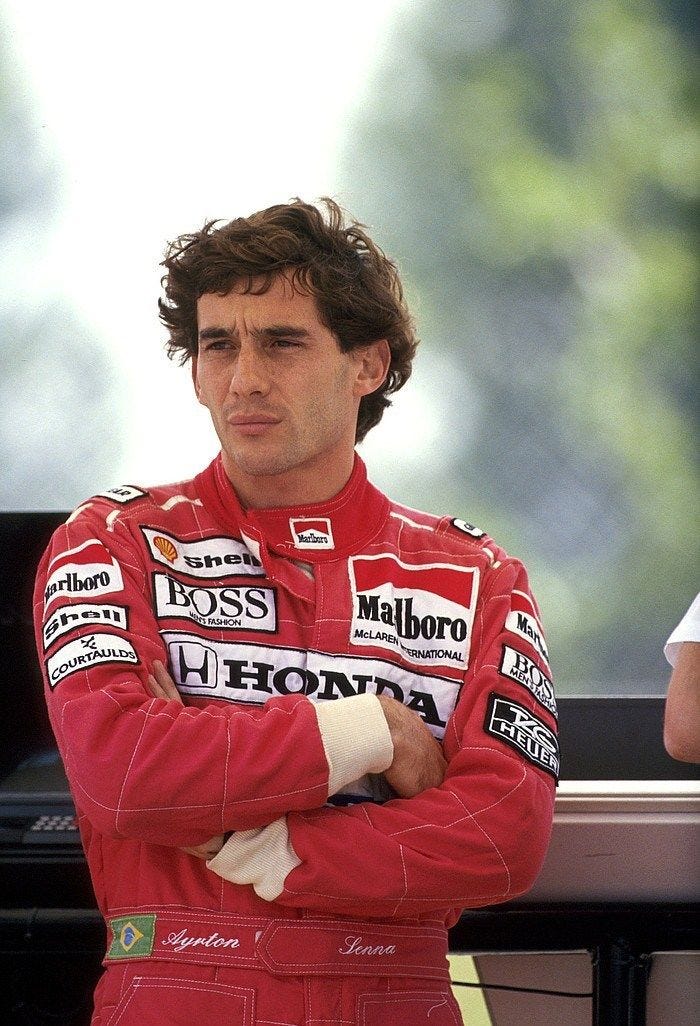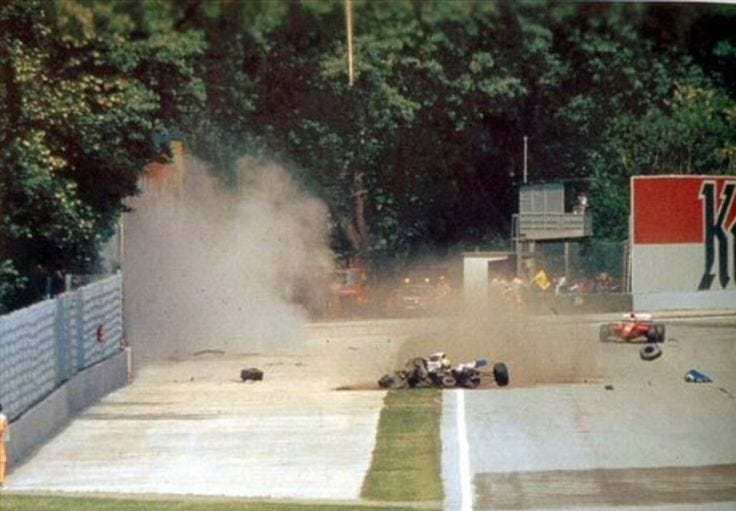Write & Lift is an ethos of personal and spiritual development through conscious physical exertion and practice of the writing craft. Through this effort to strengthen our bodies and minds, we become anti-fragile and self-respecting sovereign individuals. Through this effort, we may stand against untruth and evil and create a new culture of vitality, strength, and virtue.
Ayrton Senna: God and the Philosophy of Speed
There's something mezmerizing about watching a man operate at the absolute edge of human capability. Not just the physical limit—anyone can push their body to failure—but the metaphysical limit. The line where flesh meets spirit. Ayrton Senna lived on this line.
“On a given day, a given circumstance, you think you have a limit. And you then go for this limit and you touch this limit, and you think, 'Okay, this is the limit.' As soon as you touch this limit, something happens and you suddenly can go a little bit further. With your mind power, your determination, your instinct, and the experience as well, you can fly very high.”
Senna wasn’t just another wealthy kid born into motorsport. While he came from money, he possessed something that separated him from the standard fare of Formula 1 drivers—a deep spiritual conviction that his talent was God-given, and therefore, demanded proper stewardship. In a sport dominated by playboy heirs and corporate hobbyists, Senna's religious devotion made him an outlier. He didn't just want to win races. He wanted to honor the divine through the pursuit of excellence.
The Sacred Gift
We’ve developed this perverse idea that talent is something we own—a personal asset to be leveraged for fame, money, or status. Senna understood something deeper: transcendent talent isn't a possession; it's a responsibility. A sacred trust between the divine and the individual.
When you watch footage of Senna driving in the rain at Monaco—his legendary qualifying lap in '88—you're not just watching skill. You're watching a man in communion with his purpose. Each apex hit with microscopic precision, each throttle adjustment perfectly timed, the car dancing on the edge of physics itself. Prayer in motion.
“I'm very privileged. I’ve always had a very good life. But everything I’ve gotten out of life was obtained through dedication and a tremendous desire to achieve my goals…a great desire for victory, meaning victory in life, not as a driver.”
The modern world has no framework for understanding someone like Senna. We can process the playboy athlete, the corporate spokesperson, the social media influencer. But a man who sees and expresses his talent as a divine obligation? It doesn’t compute with our sanitized, secular understanding of excellence.
He wasn't talking about lap times when he spoke about pushing limits. He was describing the human obligation to honor God’s gifts by pursuing their fullest expression. Every time he stepped into the cockpit, he wasn't just trying to win. He was attempting to justify his talent through its perfect application.
“When you talk about religion, it’s a touching point, very easy to be misunderstood... But I try hard—as hard as I can to understand life through God. And that means every day of my life — not only when I'm home but when I’m doing my work too.”
The Burden of Excellence
This understanding of talent as a divine gift comes with a weight that few are prepared to bear. It demands a dedication that looks like madness to an outsider. Senna would spend hours analyzing telemetry data, studying corner approaches, fine-tuning his understanding of every circuit. Not because he was a perfectionist, but because anything less would have been a form of sacrilege.
His death at Imola in 1994 takes on a different meaning in this light. After leading a drivers’ meeting about safety concerns—following the death of another driver in qualifying—Senna’s car left the track at 131 mph. The man who pushed closest to the limit finally found it. He was pushing because that’s what the gift demanded.
His death was the culmination of a life lived at the intersection of human capability and divine purpose. The question isn’t whether we have Senna’s level of talent—most of us don’t. The question is whether we're willing to approach our own gifts with the same level of reverence and dedication. Are we willing to see our abilities not as personal possessions but as divine obligations? Are we prepared to push to our limits not for clout or vanity, but because that's what the gift demands?
This raw, uncompromising devotion to purpose feels almost alien. But it’s what we’re all searching for, whether we realize it or not. That's the real lesson of Senna's life: true greatness isn’t about what you can do—it's about understanding why you can do it and what that understanding demands of you. When we see talent as nothing more than a path to personal gain, we’re assaulting the most important dimension of our excellence.
We all have something—some capacity, some talent, some ability that, when properly expressed, brings us closest to the divine. For Senna, it was his supernatural ability to control a race car. For others, it might be writing, teaching, building, or any number of things.
The tragedy of our age isn’t just that we've lost touch with the sacred dimension of talent—it's that we've lost the very language to discuss it. We reduce everything to metrics, to ROI, to social media engagement. We've created a world where the highest aspiration is to be “influential” rather than excellent, to be “successful” rather than righteous. There is a paradox here: true greatness comes from selflessness, from submission. If the will to exert power through our strenghts completely dominates our field of vision we lose our humility, trust, and work ethic; the requirements for continual improvement. Competitiveness requires grace. Our gifts—whatever they may be—demand nothing less.
As always, thanks for reading.
-Joe








